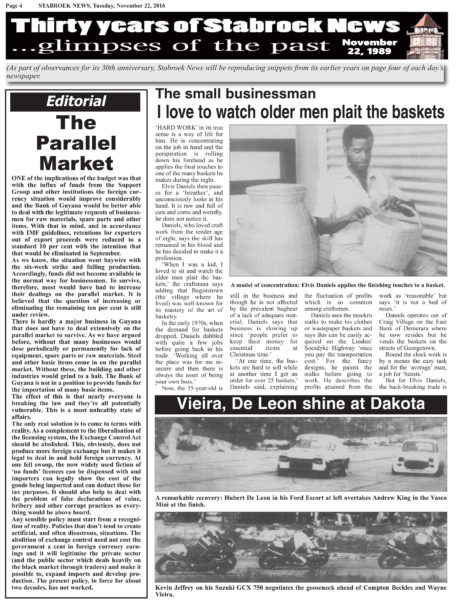ONE of the implications of the budget was that with the influx of funds from the Support Group and other institutions the foreign currency situation would improve considerably and the Bank of 
As we know, the situation went haywire with the six-week strike and falling production. Accordingly, funds did not become available in the normal way for businessmen. To survive, therefore, most would have had to increase their dealings on the parallel market. It is believed that the question of increasing or eliminating the remaining ten per cent is still under review.
There is hardly a major business in Guyana that does not have to deal extensively on the parallel market to survive. As we have argued before, without that many businesses would dose periodically or permanently for lack of equipment, spare parts or raw materials. Steel and other basic items come in on the parallel market. Without these, the building and other industries would grind to a halt. The Bank of Guyana is not in a position to provide funds for the importation of many basic items.
The effect of this is that nearly everyone is breaking the law and they’re all potentially vulnerable. This is a most unhealthy state of affairs.
The only real solution is to come to terms with reality. As a complement to the liberalisation of the licensing system, the Exchange Control Act should be abolished. This, obviously, does not produce more foreign exchange but it makes it legal to deal in and hold foreign currency. At one fell swoop, the now widely used fiction of ‘no funds’ licences can be dispensed with and importers can legally show the cost of the goods being imported and can deduct these for tax purposes. It should also help to deal with the problem of false declarations of value, bribery and other corrupt practices as everything would be above board.
Any sensible policy must start from a recognition of reality. Policies that don’t tend to create artificial, and often disastrous, situations. The abolition of exchange control need not cost the government a cent in foreign currency earnings and it will legitimise the private sector (and the public sector which deals heavily on the black market through traders) and make it possible to, expand imports and develop production. The present policy, in force for about two decades, has not worked.
The small businessman
I love to watch older men plait the baskets

Elvis Daniels then pauses for a ‘breather’, and unconsciously looks at his hand. It is raw and full of cuts and corns and weirdly, he does not notice it.
Daniels, who loved craft work from the tender age of eight, says the skill has remained in his blood and he has decided to make it a profession.
‘When I was a kid, I loved to sit and watch the older men plait the baskets,’ the craftsman says adding that Bagotstown (the village where he lived) was well-known for its mastery of the art of basketry.
In the early 1970s, when the demand for baskets dropped, Daniels dabbled with quite a few jobs before going back to his trade. ‘Working all over the place was for me insecure and then there is always the asset of being your own boss.’
Now, the 35-year-old is still in the business and though he is not affected by the prevalent bugbear of a lack of adequate material, Daniels says that business is slowing up since ‘people prefer to keep their money for essential items at Christmas time.’
‘At one time, the baskets are hard to sell while at another time I get an order for over 25 baskets,’ Daniels said, explaining the fluctuation of profits which is so common among craftsmen.
Daniels uses the mookru stalks to make his clothes or wastepaper baskets and says this can be easily acquired on the Linden/ Soesdyke Highway ‘once you pay the transportation cost.’ For the fancy designs, he paints the stalks before going to work. He describes the profits attained from the work as ‘reasonable’ but says ‘it is not a bed of roses.’
Daniels operates out of Craig Village on the East Bank of Demerara where he now resides but he vends the baskets on the streets of Georgetown.
Round the clock work is by no means the easy task and for the ‘average’ man, a job for ‘beasts.’
But for Elvis Daniels, the back-breaking trade is his ‘breadwinner’ and ‘a way of life.’

